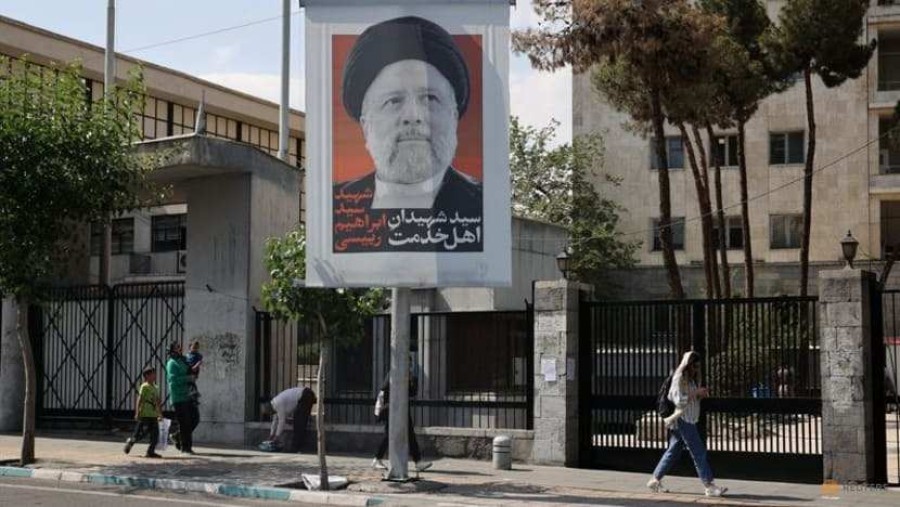Iran President Raisi’s death has no significant impact, but succession crisis may arise: Analysts

Iran President Ebrahim Raisi’s death in a helicopter crash on Sunday (May 19) will not have a significant impact on the country, but may throw it into a succession crisis, experts said.
The Supreme Leader - a position currently assumed by Ayatollah Ali Khamenei - is the most powerful political figure in Iran, not the president, noted Georgetown University Associate Professor of Middle East and Islamic Politics Nader Hashemi.
Raisi was widely considered to be a puppet of the supreme leader, and his election in 2021 was “effectively orchestrated by senior elements of the regime”, Hashemi told CNA’s Asia First on Tuesday.
“It's the supreme leader who really determines the broad contours of Iran's domestic policy and foreign policy,” Hashemi said.
“So the death of the president is not going to make a huge difference in terms of where Iran is headed, and what policies it's pursuing.” Although Iran has, in the past, had independent-minded
Associate Professor Maziyar Ghiabi, director of the Centre of Persian And Iranian Studies at the University of Exeter, similarly said that Raisi was a “political shell”.
While his death comes at a time of incredible tensions across the region and the world, his death might bear less weight than expected, Ghiabi added.
“Iran has quite a consolidated system of crisis management, and the internal process has already been put in place,” he told CNA’s World Tonight on Tuesday.
However, there might be tensions and challenges among political factions to find solutions for a successor, he added.
“It is a bit of a headache, of course, because Iran needs now to have elections to elect the next president and there's a shortage of political candidates or viable political candidates,” Ghiabi said.
Iran is expected to have an election to pick its next president on Jun 28.
WHO WILL BE PRESIDENT NEXT?
The ruling elite will not take a chance on an election where an independent-minded candidate can rise to the top and become president, said Hashemi.
“The Islamic Republic of Iran is on very shaky ground domestically - it suffers from low levels of political legitimacy. And there's a succession crisis. The leaders of the Islamic Republic of Iran, the ruling elite, are not going to are not going to want to rock the boat,” he said.
“I suspect what's going to happen is they're going to try and find another regime loyalist, similar to Ebrahim Raisi, who is a devotee of the supreme leader, and can go through the motions of getting elected,” he added.
Hashemi noted that the election will not be free and fair, but that the candidate will have the pretensions of having some popular support.
“A big challenge facing the ruling elite and Iran is: How do they conduct an election that can generate some voter turnout, so they can send a message to Iran's enemies that the regime does have popular support, when objectively speaking, it has very low levels of public support," he said.
The next president is likely to occupy his position as the country tries to navigate the future of a very uncertain succession crisis, given that a big issue for the future of Iran is who the next supreme leader will be, he said.
Raisi was among the potential candidates to take over Khamenei, who is 85 years old and ailing.
Ghiabi noted that Iran’s Assembly of Experts will elect the next supreme leader when the time comes.“Iran sees a lot of negotiations, bargaining and dealings, and it's really hard to know what is the outcome of all of these changes and negotiations,” he said.
WHY SOME ARE CELEBRATING HIS DEATH
Addressing reports that some are celebrating Raisi’s death, Hashemi said he is one of the most notorious figures in Iran with a lot of blood on his hands.
Raisi had presided over the crackdown on women's rights in 2022. He also headed the country’s judiciary in 2019 when another uprising killed at least 500 people.
More significantly, Raisi was one of four notorious hanging judges who in 1988 sent about 5,000 imprisoned political prisoners to the gallows “marking one of the darkest moments of the history of the Islamic Republic of Iran”, Hasheimi noted.
Raisi distanced himself from those massacres but bragged about them when they became public knowledge years later.
“This is a very dark person with a lot of human rights violations,” Hasheimi added.
Without any official word from Iran on the cause of the crash of the US-made Bell 212 helicopter in a mountainous region near the Azerbaijan border, there is speculation on whether foul play was involved.
Hashemi said: “It's perfectly within the realm of speculation to ask whether there are darker forces involved, given the fact that Raisi was a possible candidate for the most powerful position in the Islamic Republic of Iran, that of the supreme leader.
“Those people among Iran's ruling elite, some of them may not have wanted him to contest that position.”
However, he acknowledged that there is no way to find out for certain unless there is an independent investigation - for which there is “no likelihood” given the authoritarian political system.
